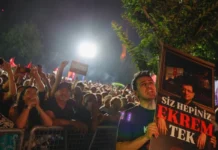Three international law associations have urged the United Nations to enter into urgent dialogue with the Turkish government with a view to ending the persecution and prosecution of legal professionals in the country.
The Bar Human Rights Committee of England and Wales (BHRC), the International Bar Association’s Human Rights Institute (IBAHRI) and the Law Society of England and Wales have written a 34-page report on breaches of the rights and protections of the legal profession in Turkey and submitted it Diego García-Sayán, United Nations special rapporteur on the Independence of Judges and Lawyers, on Tuesday in Geneva.
The report, titled “International Law Breaches Concerning the Independence of Legal Profession in Turkey,” which was submitted to the UN, dealt with human rights violations that have occurred and are occurring since a controversial coup attempt on July 15, 2016 and examined the situation after the ending of a state of emergency in Turkey.
“Primarily, new laws place in a statutory framework the pre-existing threats to the independence of the legal profession, including arbitrary arrest and detention, dismissals, and breaches of the right to a fair trial and due process,” said the international law associations in their joint letter presented the report to UN’s García-Sayán.
“Legal professionals are being targeted with allegations of supporting a terrorist organization. The evidence points to these allegations as being a strategy to stop the legitimate exercise of their professional duties, including human rights-related work,” said the letter.
The international law associations requested García-Sayán to enter into urgent dialogue with the Turkish government with a view to ending the persecution and prosecution of legal professionals in the country, saying that the already dire situation is worsening.
The international law associations have also urged the UN to send a communication to the Turkish government “to seek to guarantee the independence of the judiciary and the prosecution services, in accordance with the UN Basic Principles on the Independence of the Judiciary and the UN Guidelines on the Role of Prosecutors.

“To guarantee that all applications against dismissal decisions are considered in a fair and public hearing in a reasonable time by a competent, independent and impartial tribunal established by law as provided for in Article 14.1 of the ICCPR, Article 6.1 of the ECHR;
“Regarding all applications against dismissals under consideration by the Inquiry Commission for State of Emergency Measures, ensure that the majority of the members of the Commission are independent and impartial; not appointed by the executive; that applicants have access to case files and grounds for dismissals; that applicants can present evidence and challenge evidence filed against them; that the decisions of the Commission are reasoned, based on evidence presented by both parties, made public, and directly notified to the applicant, and that the Commission is provided enough resources to address its backlog as soon as possible;
“[To] ensure that lawyers can effectively perform their professional functions in accordance with the guarantees provided for in Article 14 of the ICCPR, the UN Basic Principles on the Role of Lawyers, and Articles 5 and 6 of the ECHR by: Repealing legislation enacting emergency decree laws which impact legal professional privilege, access to a lawyer of one’s choice, and which extend detention periods without access to a lawyer, and Removing any practical obstacles;
“To amend the anti-terror legislation (including the new Anti-Terrorism Bill adopted on 25 July 2018), and provisions in the Criminal Code as recommended by the Council of Europe, the European Court of Human Rights, and the European Union,
“To ensure that lawyers are not identified with their clients or clients’ causes and can perform their duties without intimidation, hindrance, harassment or improper, in accordance with the UN Basic Principles on the Role of Lawyers;
“Immediately end the arbitrary and systematic arrest, prosecution and detention of lawyers, drop the charges against those arbitrarily accused, and release those who are detained, unless credible evidence is presented in proceedings that comply with international fair trial standards;
“To ensure the independent and prompt investigation and prosecution of all cases of torture and ill-treatment of lawyers committed by law enforcement officers, in accordance with applicable international standards;
“Immediately end the interference in and systematic persecution of bar associations and lawyers’ associations and arbitrary arrest and prosecution of their members; and
“To ensure that lawyers are entitled to form and join independent and self-governing professional associations as protected by Principle 24 of the UN Basic Principles on the Role of Lawyers.
The report also stated that since 2010, successive legislative and constitutional reforms have significantly weakened the rule of law in Turkey by undermining the independence of judges and prosecutors. The newly acquired powers enable the government to interfere with the judiciary and the prosecution services by appointing those held in favor by the government to key judicial positions and to other institutions, by reassigning and dismissing others and by arresting and prosecuting thousands of lawyers, judges, prosecutors, and court staff.
“Such measures strongly undermine the independence of the judiciary and the prosecution and contravene the UN Basic Principles on the Independence of the Judiciary (especially Principles 1, 2, 4, 8, and 18 and 20), as well as the UN Guidelines on the Role of Prosecutors (especially Principles 2(a), 4, 8, 21 and 22),” said the report.
Reminding that Turkish citizens filed more than 90,200 petitions to the ECtHR in 2017, but over 25,000 of them were dismissed summarily as being ‘manifestly ill-founded’ by the court since domestic remedies had not been exhausted, the report stated that “Although some cases involving politicians and journalists have now been referred by the ECtHR to the Turkish government, the ECtHR has not yet made any substantive finding that the right of individual petition to the Constitutional Court is ineffective.”
Turkey’s judiciary is being criticized for acting on orders from President Recep Tayyip Erdoğan and not basing their rulings on the law. Judges in Turkey who make decisions that anger Erdoğan are either replaced or jailed. Turkey has fallen to the 101st position out of 113 countries in the World Justice Project’s (WJP) 2017-18 Rule of Law Index, a comprehensive measure of the rule of law.
The Turkish government has arrested a total of 2,431 judges and prosecutors and dismissed 4,424 others since a controversial military coup attempt on July 15, 2016, a Constitutional Court general assembly ruling revealed on early August 2017.
The Turkish government led by President Erdoğan has prosecuted 1,546 lawyers on overbroad charges based on questionable accusations that preclude the right to a defense; 585 lawyers remain under arrest, and 169 lawyers have been sentenced to jail terms ranging from three to 12 years, according to data compiled by the Arrested Lawyers Initiative.
Hundreds of thousands of people in Turkey have been the subject of legal proceedings in the last two years on charges of membership in the Gülen movement since a coup attempt on July 15, 2016, a Turkish Justice Ministry official told a symposium on July 19, 2018.
“Legal proceedings have been carried out against 445,000 members of this organization,” Turkey’s pro-government Islamist news agency İLKHA quoted Turkish Justice Ministry Deputy Undersecretary Ömer Faruk Aydıner as saying.
Turkey survived a controversial military coup attempt on July 15, 2016, that killed 249 people. Immediately after the putsch, the Justice and Development Party (AKP) government along with President Recep Tayyip Erdoğan pinned the blame on the Gülen movement.
Fethullah Gülen, who inspired the movement, strongly denied having any role in the failed coup and called for an international investigation into it, but President Erdoğan — calling the coup attempt “a gift from God” — and the government initiated a widespread purge aimed at cleansing sympathizers of the movement from within state institutions, dehumanizing its popular figures and putting them in custody.
Turkey has suspended or dismissed about 170,000 judges, teachers, police and civil servants since July 15, 2016. On December 13, 2017, the Justice Ministry announced that 169,013 people have been the subject of legal proceedings on coup charges since the failed coup.
Turkish Interior Minister Süleyman Soylu announced on April 18, 2018, that the Turkish government had jailed 77,081 people between July 15, 2016, and April 11, 2018, over alleged links to the Gülen movement.

















[…] http://stockholmcf.org/intl-law-associations-urge-un-to-pressure-on-turkish-govt-over-persecution-o… […]